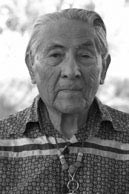
A Rich Legacy Dr. Medicine Crow’s grandparents lived before the United States Government sent Indians to a reservation in 1884. His father was a boyhood friend of Chief Plenty Coups and had advised Plenty Coups to go to the nation’s capital to present the Indians cases for preserving their ancestral land. Medicine Crow was the first one of his tribe to earn a Master’s Degree. He attended the University of Southern California and earned his degree in 1939. Military Exploits
One of the requirements he accomplished also complied with the U.S. government policy. During World War 2 he served in Europe. One of his most notable exploits occurred in a planned raid. His unit hit a little town with just one main street. He did not want to participate in such a raid but instead asked his superior’s permission to have a little extra time to accomplish a deed. The Commanding Officer (C.O.) sent him around the street and down an alley. He saw an opening in a gate and a German was doing the same thing. They bumped heads and Joe gave him a butt stroke with his rifle and knocked the enemy’s rifle out of his hand. Another time, Joe’s company had breached the German line and pushed them into the hills. The Germans came back, surrounding Joe’s company which had run out of ammunition. The C.O. said if anybody could get through it would be Joe. He was ordered to lead a group of soldiers on a mission through the lines to procure much needed ammunition. Joe was 34 years old; the old man of his company. Medicine Crow led his squad through land mines, avoiding enemy fire to reach the U.S lines. There they had a quick meal and managed to return to their company with ammunition. Medicine Crow was scouting ahead of his company when he saw some Germans riding horses along a road. It was near dark so he followed them to a ranch with a shed, unsaddled and then went inside. The idea was to attack early in the morning while the enemy was still sleeping. A Big War Whoop Accolades As an historian and anthropologist he wrote several books and has continued his work as Tribal Historian. He authored the script that has been used at the reenactment of the Battle of the Little Bighorn held every summer in Hardin, Montana since 1965. But in war he said “No One wins. Both sides lose. The Indians, so called hostiles, won the battle of the day, but lost their way of life.” “The worst enemies are ourselves”, he said. |
Last updated: September 28, 2022
